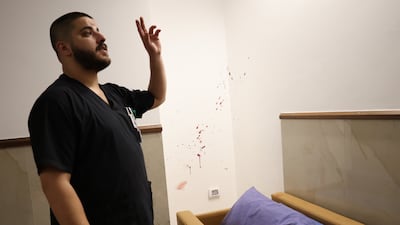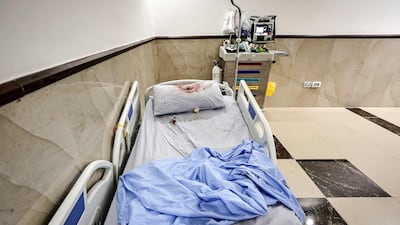Live updates: Follow the latest on Israel-Gaza
It was early in the morning in one of Jenin’s main hospitals, when a bearded man rang the doorbell of a rehabilitation ward for severely injured patients.
The man was buzzed in by a woman in her early twenties who sat alone at the pristine reception desk.
She asked the man who he had come to see, but – another staff member told The National – was then hit on the head with the butt of a gun before she could scream.
More armed people flooded the room, dressed as patients, medical staff and family members.
Some stood guard. Others moved a few metres to the left. Muffled shots left three Palestinian men, including a patient, dead.
The occupied West Bank, already on the point of eruption, had just witnessed an Israeli undercover assassination inside a medical centre. The Ibn Sina Hospital had been turned into a kill zone.
The three targets were Bassel Ghazzawi, 18, who was being treated for a spinal injury that had left him paralysed; his brother, Mohammed Ghazzawi, 23; and Mohammed Jalamneh, 27.
The Israeli army said Jalamneh was the primary target of the operation, and alleged that he was planning an attack on Israel and had been in contact with Hamas headquarters abroad. It said the brothers were also militants.
Whatever the circumstances, their killing is an escalation that has shocked Palestinians in the West Bank, about four months into the Gaza war.
Two hospital staff on the ward where the three were killed say they now fear doing the night shift.
“I view this as the Israelis warning hospitals: don’t treat wanted guys,” one of the rehabilitation nurses says. “How can we ever respect this? We don’t identify the people we treat or study their backgrounds. They are only our patients.”
A Gazan on the ward summed up the sense of terror among those in the hospital.
“In Gaza, you see [Israeli forces] in the air, but here you see them for real,” he said.
Nearby, a child peeked out from behind the corner. Another, in blue pyjamas, is hoisted into his father’s arms.
“I brought my two-year-old son to Jenin from Gaza for treatment before October 7,” he said. “It is my bad luck that even here the war follows us. It’s not safe. There are kids running round [the ward] the whole time.”
His little boy was sleeping on the opposite side of the ward from where the three were killed. The parents are not letting their children anywhere near the room where it happened. The site is too gruesome.
On entry, specks of blood dot the floor.
Once inside, the eye is drawn to Bassel’s pillow, which now bears a bloodstain and a hole in the middle.
A copy of the Quran is one metre to the right, on the bedside table.
Bassel was asleep at the time of the attack, hospital staff say, as were his brother and friend.

The rest of the room is less tidy. An easy-wipe hospital sofa and chair are covered in blood which has pooled on the floor and sprayed the roof and walls.
“We have shared rooms on this ward,” one of the nurses says, on the threshold of the carnage. “Imagine if there was another patient sharing? They would have been killed too.”
Hours have passed since the assassination, but staff at the hospital have not started cleaning the room. Uneaten food and sacks of clothes still lie around.
The mother of the Ghazzawi brothers might well have brought them. She left the room just before her sons and their friend were killed, hospital staff say. She was soon back, wailing at the side of her son’s bed and in the corridors of the hospital.
“My children are gone – all gone,” she said. “Thank God, may their hardship be rewarded.”
In the last conversation that the two nurses had with Bassel, three days before he was killed, the 18-year-old invited them to his house to celebrate the day he would be discharged from the hospital. His mother would cook for her son’s carers.
“His dream was to walk again. Step by step he was getting there. We saw an improvement," one of the nurses said.
“What kind of planning could those three have been doing? What can a guy who can’t move his lower body do? What threat is he to Israel?”






